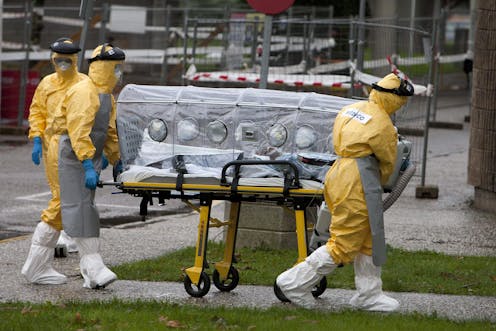Go offline with the Player FM app!
Speaking with: Peter Doherty about infectious disease pandemics
Manage episode 181459734 series 97188

Humans have had to deal with infectious diseases for centuries. Ancient Greeks and Egyptians suffered from smallpox, leprosy and tuberculosis. And when an outbreak occurs, it can be devastating.
Pandemics like the Black Plague, Spanish Flu and HIV have killed millions of people around the world.
While improved sanitation and a better understanding of how infections spread has helped halt some pandemics, we are never truly safe. Recent outbreaks of Ebola in Western Africa and the Zika virus in the Americas show how vulnerable we are.
William Isdale speaks with Melbourne University Professor and Nobel prize winner Peter Doherty about how infectious diseases start and spread, and what can be done by governments, health organisations and individuals to minimise the threat of a pandemic.
Subscribe to The Conversation’s Speaking With podcasts on iTunes, or follow on Tunein Radio.
Additional Audio
Music
William Isdale does not work for, consult, own shares in or receive funding from any company or organisation that would benefit from this article, and has disclosed no relevant affiliations beyond their academic appointment.
73 episodes
Manage episode 181459734 series 97188

Humans have had to deal with infectious diseases for centuries. Ancient Greeks and Egyptians suffered from smallpox, leprosy and tuberculosis. And when an outbreak occurs, it can be devastating.
Pandemics like the Black Plague, Spanish Flu and HIV have killed millions of people around the world.
While improved sanitation and a better understanding of how infections spread has helped halt some pandemics, we are never truly safe. Recent outbreaks of Ebola in Western Africa and the Zika virus in the Americas show how vulnerable we are.
William Isdale speaks with Melbourne University Professor and Nobel prize winner Peter Doherty about how infectious diseases start and spread, and what can be done by governments, health organisations and individuals to minimise the threat of a pandemic.
Subscribe to The Conversation’s Speaking With podcasts on iTunes, or follow on Tunein Radio.
Additional Audio
Music
William Isdale does not work for, consult, own shares in or receive funding from any company or organisation that would benefit from this article, and has disclosed no relevant affiliations beyond their academic appointment.
73 episodes
All episodes
×Welcome to Player FM!
Player FM is scanning the web for high-quality podcasts for you to enjoy right now. It's the best podcast app and works on Android, iPhone, and the web. Signup to sync subscriptions across devices.




